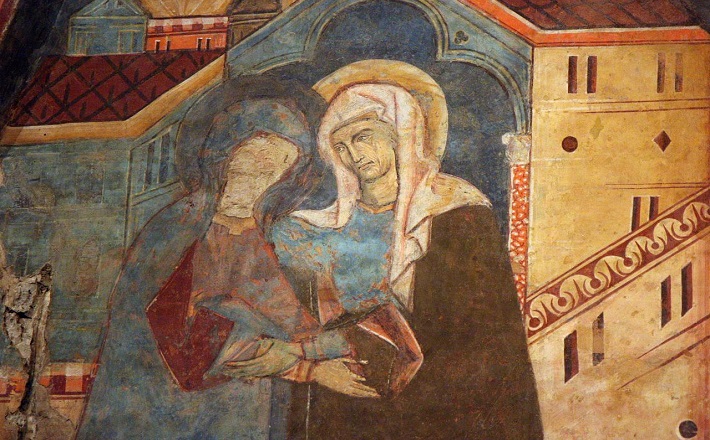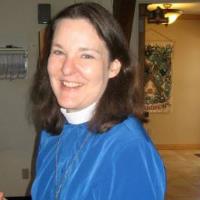Commentary on Luke 1:39-45 [46-55]
Having learned from the angel that she will give birth to the Son of God, Mary hurries to visit her pregnant relative Elizabeth in the hill country.
The intimate conversation that follows portrays Jesus as more important than John. It also shows God already at work to overturn the world’s structures and expectations. The spotlight shines on Mary and Elizabeth, two lowly and shamed ones through whom God has chosen to begin the transformation of the world.
Women — so often overlooked or ignored both in society at large and in biblical narratives — have the only speaking roles in this vignette. Mary’s first words prompt an immediate, silent, response from Elizabeth’s unborn child. John leaps, acknowledging both her presence and the significance of the child she carries in her womb. John’s reaction to Mary’s voice fulfills Gabriel’s prophecy, “even before his birth he will be filled with the Holy Spirit” (Luke 1:15). Already John points to the coming one.
Though Luke clearly signals that the unborn child’s leaping is prompted by the Spirit, it is Elizabeth, John’s mother, who takes on the role of prophet by speaking the prophetic word in this scene: she is filled with the Holy Spirit and proclaims what Mary has not yet told her, and what is not yet visible to the eye: Mary is pregnant. Furthermore, through the Spirit she knows who Mary’s child will be, for she calls Mary “the mother of my Lord.” Her prophecy will soon be fulfilled when her own son prepares the way for the Lord.
Elizabeth not only prophesies but blesses. By declaring both Mary and the fruit of Mary’s womb “blessed” she begins a series of blessings that weave through Luke’s birth narrative and intensify its tone of joy, delight, and praise. Mary, Zechariah, and Simeon will all add their blessings to the chain, praising God for what God is doing at this moment in history and recognizing that those who are privileged to be instruments of God’s saving work have been richly blessed.
Mary is blessed not only for her status as the mother of the Lord, but also for her trust in God’s promise. Our English translations obscure the fact that Elizabeth uses more than one word for “blessed.” When she pronounces Mary “blessed … among women” and proclaims that the fruit of Mary’s womb is blessed, she uses the term eulogemene/os, which emphasizes that both present and future generations will praise and speak well of her and her child. But when she says, “Blessed is she who believed that there would be a fulfillment of what was spoken to her by the Lord” (v. 45), she uses the word makaria, the same term that Jesus uses to bless people in the Beatitudes. We might well translate Elizabeth’s words as “Happy is she who believed … ” Mary is blessed because despite all expectations her social status has been reversed: she will be honored rather than shamed for bearing this child. But she has also been blessed with divine joy — with beatitude — because she has believed that God is able to do what God promises to do.
When Elizabeth says, “Blessed is she who believed that there would be a fulfillment of what was spoken to her by the Lord,” she implicitly contrasts Mary’s trust in God’s power and promise with her own husband Zechariah’s skeptical questioning. Zechariah asked for proof that the angel’s word was true. Mary asked for an explanation of what was going to happen to her, and then gave her willing consent. Zechariah the religious professional doubted God, but Mary the peasant girl believed, and her trust in God’s word opened the door for God to bless her and to bless the whole world through her. Elizabeth celebrates Mary’s willingness to say “yes” to God.
By greeting Mary with honor, Elizabeth overturns social expectations. Mary is an unmarried pregnant woman. She might expect social judgment, shame, even ostracism from her older kinswoman. Yet Elizabeth knows from her own experience the cost of being shamed and excluded. In her culture a woman’s primary purpose in life was to bear children, so as an elderly infertile wife she had endured a lifetime of being treated as a failure. Her response to her miraculous pregnancy emphasizes that God’s grace has reversed her social status: “This is what the Lord has done for me when he looked favorably on me and took away the disgrace I have endured among my people” (Luke 1:25). At long last, in her old age, she is an honorable married woman, pregnant with her husband’s son.
Elizabeth continues the pattern of social reversal by opening her arms and her home to a relative whom her neighbors would expect her to reject. Instead of shaming Mary, she welcomes, blesses, and celebrates her, treating her as more honorable than herself. Thus the pregnancy that might have brought Mary shame brings joy and honor instead. When Elizabeth welcomes Mary, she practices the same kind of inclusive love that Jesus will show to prostitutes and sinners. She sees beyond the shamefulness of Mary’s situation to the reality of God’s love at work even among those whom society rejects and excludes.
Elizabeth’s words and actions invite us to reflect on our own openness to the ways that God chooses to act in our world. What is God doing through unexpected people in our society today? Where is God at work through people whom our neighbors and fellow church members often exclude or treat as shameful? Will we listen to the Spirit’s prompting when the bearers of God’s new reality show up on our doorstep?
May we, like Elizabeth and Mary, trust that God is coming to save and free us. May we, like them, give thanks that God has taken away our shame and then respond to God’s love by welcoming the shameful. May we, like them, become a community that supports each other as we hope and wait.


December 20, 2015